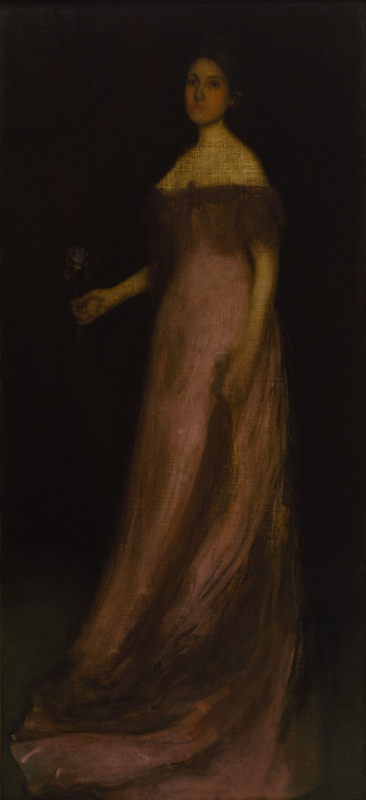Provenance
- 1903: in Whistler's studio at his death in 1903 and passed to his ward and executrix, Rosalind Birnie Philip (1873-1958);
- 1904/1905: sent by her to the sitter's sister, Catherine ('Kate') Kinsella, Marquesa Presbitero (b. ca 1866) , Rome;
- 1923: after the sitter's death, ownership passed to the Marchesa Presbitero;
- ca 1944: given to her niece, Olivia Frances Kinsella Robinson (Mrs Cecil F. D. H. B. Durham) (1903-1984) , Basingstoke;
- By 1955: given to her daughter, Anne-Louise Durham (Mrs R. Pleydell-Bouverie) (1940-1996) and son-in-law, Robin Pleydell-Bouverie (b. 1937, div. 1975) ;
- 1972: sold by them to Meredith J. Long (n/a) , art dealer, Houston.
- 1974-1975: with Davis & Long Co., New York dealers;
- 1977: sold by Davis & Long Co. to the Virginia Steele Scott Foundation;
- 1980/1987: with Davis & Langdale Co., Inc., New York;
- 1987: bought by Daniel J. Terra (1911-1996) for the Terra Foundation for American Art, Chicago;
- 2015: transferred to the Art Institute of Chicago.
In 1907, despite the efforts of Dugald Sutherland MacColl (1859-1948), the National Gallery, London refused to purchase the portrait. 1
The painting was lent by the Marchesa Presbitero to the Tate Gallery in 1934, and by Mrs D. M. Rowan Rhys to the Tate Gallery in 1951. 2 Mrs Durham's daughter and son-in-law, Mr and Mrs Robin Pleydell-Bouverie, lent it to an exhibition in the Leicester Galleries in 1955 (it was not in the catalogue).
Exhibitions
- 1904: Ouvrages de Peintures, Sculpture, Dessin, Gravure, Architecture et Objets d'Art, 14th exhibition, Société Nationale des Beaux-Arts, Paris, 1904 (cat. no. 1315) as ' "Rose et Violet (L'Iris)" unfinished.'
- 1905: Memorial Exhibition of the Works of the late James McNeill Whistler, First President of The International Society of Sculptors, Painters and Gravers, New Gallery, Regent Street, London, 1905 (cat. no. 44) as 'Rose et Vert, L'Iris: Portrait of Miss Kinsella'.
The painting was described as unfinished in the catalogue of the 1904 exhibition, and indeed, Maurice Hamel (fl. 1887-1905) in his review of the Salon, certainly took it to be so. 3 The photograph reproduced in his review may date from that time, or have been taken earlier: it appears sharper and more detailed than the painting in its current state.
While accepting that the portrait was not finished, the art critic of The Athenaeum wrote an enthusiastic review, delighted that 'the right inspiration could rouse the real genius of the man to the very end.' The critic continued:
'We see too, in this mysteriously beautiful figure a poetry, a tenderness of feeling, which can hardly be found elsewhere in the artist's work. It is, in fact, one of the few dramatic portraits Whistler has painted – one of the few in which a mood gives to every line and tone a particular significance. The tall figure, dressed in a long trailing gown of deep rose mauve, moves before a deep violet curtain … The movement is not completely worked out … She seems to have come forward slowly with an almost queenly stateliness and distinction of bearing, but then to have hesitated … like some sleep-walking beauty who has woken in an age that has forgotten courtliness; and the hesitation of the movement is echoed in the proud pathos of the face. The colour is marvellous; it is very low in tone, and no words can be found to describe the elusive ... tints of deep violet and rose against which the flesh of dull golden hue is relieved. It is unfinished, it is true; the shadow tones of the dress are not quite in key, the position of the left arm is not perfectly ascertained; but enough is here to make this a great Whistler.' 4
With which sympathetic and poetically expressed opinion the artist would undoubtedly have agreed!
It is recorded that when Auguste Rodin (1840-1817) saw the painting in 1905, 'he praised neck and bust as "a beautiful suggestion of lace," ' but the Pennells, in reporting this praise, added that this was because it was 'so badly disfigured by scraping and repainting.' 5
Last updated: 25th November 2020 by Margaret






